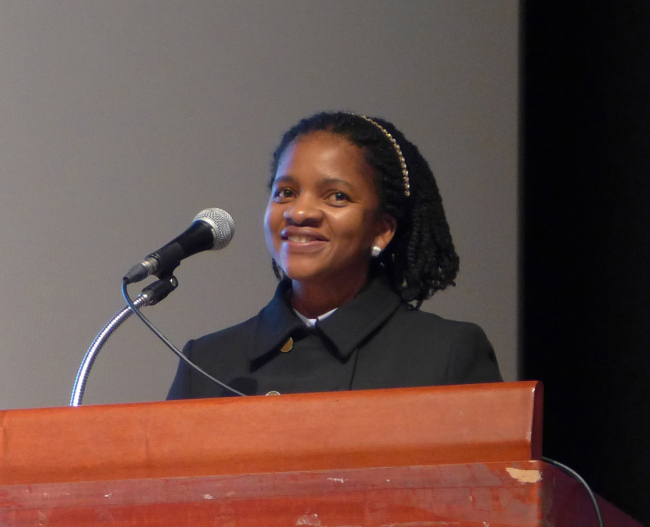“Apartheid,” a system of racial segregation in South Africa from 1948 to 1994, meant “the state of being apart,” literally “apart-hood” in Afrikaans.
Following the creed enforced by the country’s then-governing political group the National Party, apartheid separated the multiethnic state, communities and families of South Africa, gating white privilege while downgrading black and minority rights.
The South African embassy, in collaboration with the Korean Cultural Association, held a film screening event Thursday at the Seoul Museum of History with the movie “Skin,” in an effort to shed light on South Africa’s dark history.
“Skin” is a 2008 biographical film based on the true story of Sandra Laing, a South African woman born to white parents, whose race was classified and reclassified by the government as being “black.”
The bulk of the plot takes place in the mid-1960s in the thick of a racially charged era, portraying the inner contradictions of segregation on multiple personal levels.
Following the creed enforced by the country’s then-governing political group the National Party, apartheid separated the multiethnic state, communities and families of South Africa, gating white privilege while downgrading black and minority rights.
The South African embassy, in collaboration with the Korean Cultural Association, held a film screening event Thursday at the Seoul Museum of History with the movie “Skin,” in an effort to shed light on South Africa’s dark history.
“Skin” is a 2008 biographical film based on the true story of Sandra Laing, a South African woman born to white parents, whose race was classified and reclassified by the government as being “black.”
The bulk of the plot takes place in the mid-1960s in the thick of a racially charged era, portraying the inner contradictions of segregation on multiple personal levels.

In an interview with The Korea Herald, South African Ambassador Nozuko Gloria Bam said that since the democratic election of late Nelson Mandela in 1994, South Africa has made “significant progresses” across comprehensive spheres, including legal and political institutions, education, health and housing.
“South Africa walked away from the precipice of war and bloodshed to create a democratic state based on a progressive constitution,” she said. “The end of apartheid restored dignity to all South Africans, rolling back the shadow of history and broadening opportunities for all.”
The ambassador stressed that despite the advances made in building an inclusive society, healing the wounds of the past and redressing decades-long inequalities remained government imperatives.
As one of the most unequal economies in the world, the privileges attached to race, class, space and gender have not been fully reversed, she pointed out.
As an example, blacks received inferior education that would ensure inferior positions in society, the ambassador said, as vividly depicted by protagonist Sandra in a segregated white school. From 1960 to 1983, 3.5 million nonwhite South Africans were forcibly removed from homes into segregated neighborhoods, a scene mentioned in the film.
Japanese, South Koreans and Taiwanese immigrants, with whom South Africa maintained diplomatic and economic relations, were given an “honorary white” status out of “white,” “black,” “colored” and “Indian” racial classifications, while Chinese descendants of migrant workers from the late 19th century were labeled “colored.”
John Redmond, a British freelance journalist and long-time resident of Korea who lived in South Africa in the 1970s, told The Korea Herald of his firsthand experience of apartheid.
“It was very horrible and I hated it even as a privileged white guy,” Redmond said. “Many people were opposed to it for sure, including Afrikaners. The rich and powerful whites tended to be more vocal about it, either for or against, as they did not have to fear losing their jobs.”
Redmond, who visits Cape Town each year, said that the younger generations born after 1994 had “no concept of apartheid whatsoever,” although the older generations still had “lingering doubts about things.”
More tolerance is being seen in sports, music, art and fashion these days, he noted, indicating that black and white athletes perform well together in rugby, cricket and surfing.
By Joel Lee (joel@heraldcorp.com)
-
Articles by Korea Herald




![[KH Explains] No more 'Michael' at Kakao Games](http://res.heraldm.com/phpwas/restmb_idxmake.php?idx=644&simg=/content/image/2024/04/28/20240428050183_0.jpg&u=20240428180321)




![[Grace Kao] Hybe vs. Ador: Inspiration, imitation and plagiarism](http://res.heraldm.com/phpwas/restmb_idxmake.php?idx=644&simg=/content/image/2024/04/28/20240428050220_0.jpg&u=)









